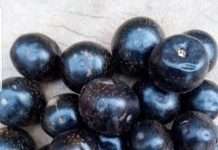Mangoes, botanically known as Magnifera indica (fam: Anacardiaceae) make for one of the most popular fruits across the world. There are hundreds of types of mangoes, each with a unique taste, shape, size and colour. The colour of ripe mango could be yellow, orange or red, while the unripe mango is green in colour.
Constituents
Mango contains calories, protein, carbohydrates, fat, dietary fibre, folate, vitamins C, B1, B2, B6, B5, A, E, K, niacin, potassium, manganese and magnesium. Also contained in mango are antioxidants, such as isoquercitrin, quercetin, astragalin, gallic acid, fisetin, methyl gallate, tartaric acid, malic acid, citric acid and glutamic acid, which is an important alpha-amino acid for the brain. The leaves of mango contain magniferin and tannins.
Preparations
Mangoes are usually eaten raw; they may be cut in pieces and added to salads or to ice creams.
Mashed mango may be mixed with milk and honey forming a paste to be used as body scrub.
Mango leaves may be prepared as an infusion by boiling and soaking overnight.
Mango fruit may be dried and serve as snacks, juiced, or canned and used to make sauces, stew and preservatives.
Pharmacological actions and medicinal uses
Mango, the king of all fruits, has been shown to have many health benefits.
Mangoes could help facilitate healthy digestion. They are reported to contain enzymes that aid the breakdown and digestion of protein, and also fibre, which keeps the digestive tract working efficiently, while inducing a feeling of satiety. The phytochemicals in the mango skin act as natural fat-busters. Thus, mangoes, when eaten in moderation, could also help in weight loss.
The dietary fibre in mango helps regulate blood sugar levels. Studies in Japan and Mysore, respectively, proved that the extract of a mango peel has anti-diabetic properties with beneficial effects on type 2 diabetes patients. Mango leaves are reported to help regulate insulin levels. They also serve as a stomach tonic.

The beta-carotene in mangoes help in the production of Vitamin A, the powerful antioxidant that helps improve vision and boosts overall eye health. According to a Boston study, mangoes contain a carotenoid called cryptoxanthin that was found to reduce the risk of age-related macular degeneration in elderly Japanese people.
Mango has antioxidants which protect the body against breast, colon and prostate cancers, as well as leukaemia. Mangiferin has also been found to inhibit the growth of colon and liver cancer cells and other tumor cells as well.
Mangoes have the ability to increase virility in men because of the vitamin E content. The fruit may aid menopausal and pregnant women because of its high iron and calcium levels.
In some parts of the Caribbean Islands, the mango leaf decoction is used to treat diarrhoea.
Mangoes are also found to exhibit anti-ulcer activity, given the presence of tannins, flavonoids, and saponins.
Adverse effects
Excessive consumption of mangoes hinder weight loss plan, increase blood sugar levels. Indigestion and mango mouth can especially be caused by immature mango. Other adverse effects of excessive mango consumption include Salmonella infections, allergic reactions (watery eyes, respiratory problem, colds, sneezing and abdominal pain).
Economic potentials
Experts believe mango has enormous potential that can transform the economy like other traditional export produce, such as cocoa. It has been reported that a mango farm belonging to a former northern governor generated as much as ₦5 billion yearly. There are opportunities in farming, exportation, local sales and processing of mango.
Mango may also be explored as a raw material in the pharmaceutical and food industry.














Like!! Really appreciate you sharing this blog post.Really thank you! Keep writing.